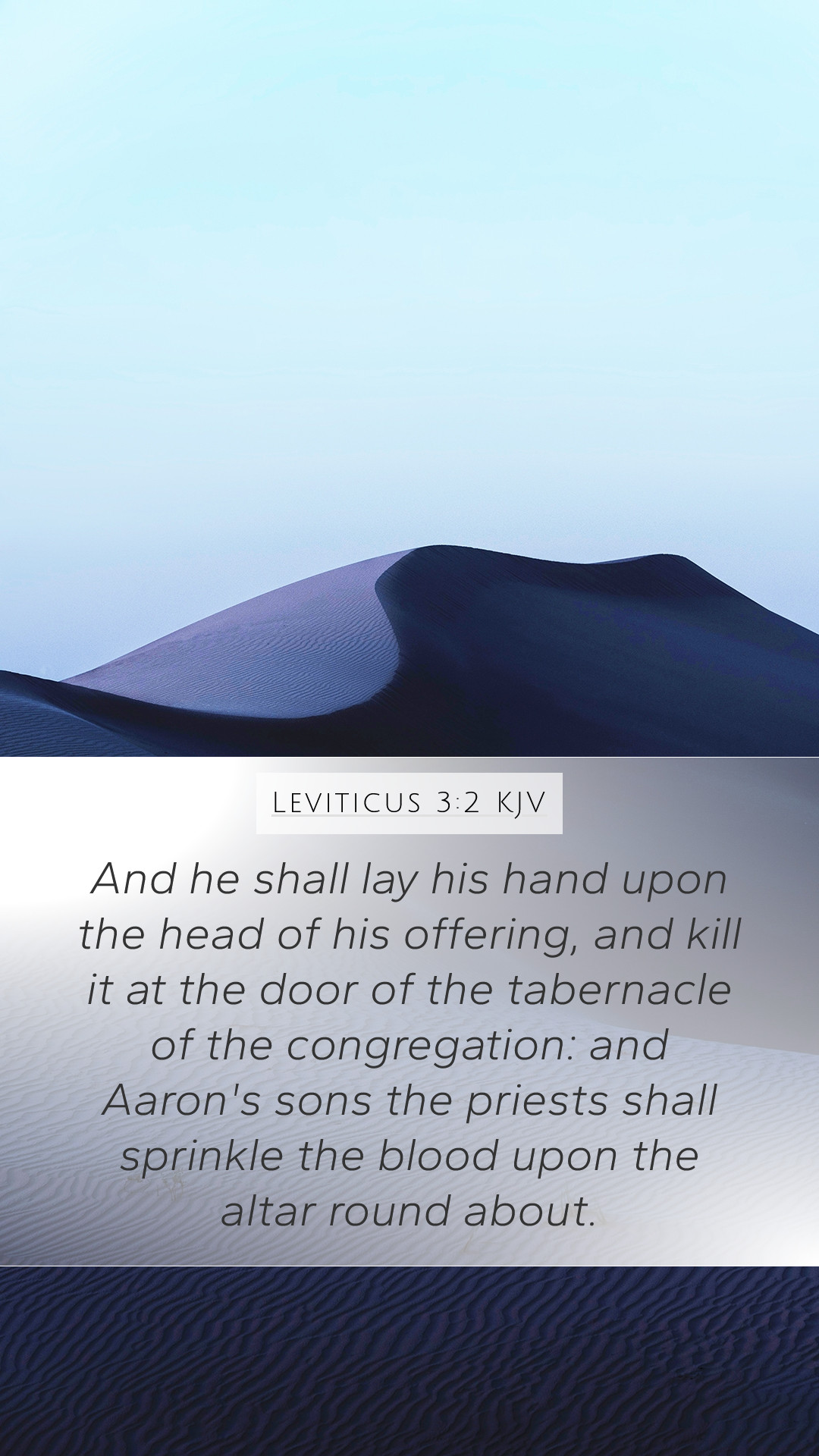Understanding Leviticus 3:2
Leviticus 3:2 states: "And he shall lay his hand upon the head of his offering, and kill it at the door of the tabernacle of the congregation: and Aaron's sons the priests shall sprinkle the blood upon the altar round about."
This verse serves as part of the law concerning peace offerings, an essential element of the ancient Israelite sacrificial system. The laying of hands on the animal signifies the transfer of sin, guilt, or gratitude from the offerer to the offering. The act of killing the offering at the entrance of the tabernacle signifies public acknowledgment of the worshipper's intent.
Key Themes and Insights
- Transfer of Guilt: The laying on of hands symbolizes the offerer's identification with the sacrifice, thus showcasing the personal nature of atonement (Matthew Henry).
- Public Worship: Killing the offering at the door indicates a communal aspect of worship, where the act is both private and public, reinforcing the relationship with God and the community (Albert Barnes).
- Blood as Life: The act of sprinkling blood signifies the seriousness of sin and its consequences, as blood represents life and the necessary means for atonement (Adam Clarke).
- Role of the Priests: The involvement of Aaron's sons signifies the structured priestly system that serves as mediators between God and man, pointing to the importance of reverence in worship.
Bible Verse Commentary
The verse elaborates on the peace offering, a kind of sacrifice signifying thankfulness and joy to God. It reflects the Israelite faith whereby offerings were not simply ritualistic; rather, they expressed deep gratitude for God's provisions and peace.
Importance in Scripture Analysis
This passage is critical for understanding the overall significance of sacrifice in the Old Testament. It highlights the theological concept of substitutionary atonement, where an innocent life is offered in place of the guilty.
Connecting with Other Scriptures
Leviticus 3:2 can be related to several other biblical passages:
- Genesis 4:4: Abel's offering, showing the acceptance of true sacrifice.
- Leviticus 17:11: The purpose of blood, symbolizing life and atonement.
- Hebrews 9:22: The significance of blood for remission of sins.
Application of Leviticus 3:2 in Daily Life
This verse offers profound insights into how believers are to approach God. It invites reflection on personal sacrifices and the importance of heartfelt worship.
- Symbol of Commitment: In modern terms, the laying on of hands can symbolize one's commitment to faith and the integral role of community in spiritual practice.
- Understanding Sacrifice: Believers may reflect on what they are willing to offer to God in terms of time, resources, and talents, paralleling the biblical principle of sacrifice.
- Building Relationships: The communal aspect of offering encourages building and maintaining relationships within church and community settings.
Conclusion
Leviticus 3:2 invites us to more than just ritual; it calls for an understanding of the heart behind offerings, an acknowledgment of God’s provisions, and a celebration of the grace that allows for communion with Him. The themes in this verse resonate deeply with the overall narrative of redemption found throughout Scripture.
Further Study and Exploration
For those interested in delving deeper into the meanings of Bible verses, we recommend using various Bible study tools and resources that help facilitate in-depth Bible verse analysis, including:
- Commentaries and exegesis tools
- Bible study guides for personal and group study
- Online Bible study courses for structured learning


